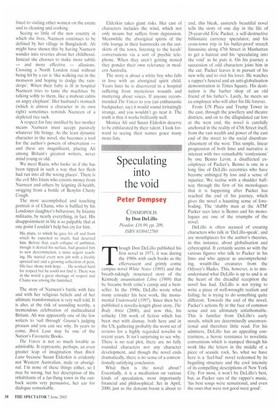Speculating into the void
Peter Dempsey
COSMOPOLIS by Don DeLillo Picador, £16.99, pp. 209, ISBN 0330912760 Though Don DeLillo published his first novel in 1971, it was during the 1980s with such books as the effervescent and grimly comic campus novel White Noise (1985) and the breath-takingly structured story of the Kennedy assassination Libra (1989) that he became both critic's catnip and a bestseller, In the 1990s. DeLillo wrote what many consider his best work, the monumental Underworld (1997). Since then he's published a novella-length ghost story. The Body Artist (2000), and now this, his unlucky 13th work of fiction which has been met with dismay, both here and in the US, gathering probably the worst set of reviews for a highly regarded novelist in recent years. It isn't surprising to see why. There is no real plot, there are no fully rounded characters nor any character development, and though the novel ends dramatically, there is no sense of a conventionally satisfying conclusion.
What then is the novel about? Essentially, it is a meditation on various kinds of speculation, most importantly financial and philosophical. Set in April. 2000, just as the dotcom boom is about to end, this bleak, austerely beautiful novel tells the story of one day in the life of 28-year-old Eric Packer, a self-destructive billionaire currency speculator, and his cross-town trip in his bullet-proof stretch limousine along 47th Street in Manhattan to get a haircut and his 'speculating into the void' as he puts it. On his journey a succession of odd characters joins him in the car. Packer leaves it in pursuit of his new wife and to visit his lover. He watches a rapper's funeral and an anti-globalisation demonstration in Times Square. His destination is the barber shop of an old friend of his father's. Lastly, he meets an ex-employee who will alter his life forever.
From UN Plaza and Trump Tower in the east, through the jewellery and theatre districts, and on to the dilapidated car lots at the west end, the novel is carefully anchored in the reality of 47th Street itself, from the vast wealth and power of the east end of the street to the social disenfranchisement of the west. This simple, linear progression of both limo and narrative is intercut with two remarkable 'confessions' by one Benno Levin, a disaffected exemployee of Packer's. Benno is one in a long line of DeLillo eccentrics who have become unhinged by loss and a sense of injustice. We realise with a shudder halfway through the first of his monologues that it is happening after Packer has reached the end of his journey, which gives the novel a haunting sense of foreboding. The 'shabby man at the ATM' Packer sees later is Benno and his monologues are one of the triumphs of the novel.
DeLillo is often accused of creating characters who talk in `DeLillo-speak', and are mouthpieces for the author's theories, in this instance, about globalisation and cybercapital. It certainly seems so with the various figures who talk to Packer in his limo and who appear as uncomprehending, wraith-like creatures from the Odyssey's Hades. This, however, is to misunderstand what DeLillo is up to and is at the heart of the dreadful reception the novel has had. DeLillo is not trying to write a piece of well-wrought realism and failing: he is trying to do something quite different. Towards the end of the novel, Packer's actions fly in the face of common sense and are ultimately unfathomable. This is familiar from DeLillo's early novels, which are determinedly unconventional and therefore little read. For his admirers, DeLillo has an appealing contrariness, a heroic resistance to novelistic conventions which is stamped through his work like the letters in the middle of a piece of seaside rock. So, what we have here is a 'feel-bad' novel redeemed by its beguiling structure and the cool intensity of its compelling descriptions of New York City, For most, it won't be DeLillo's best, but, as Packer says of the rapper's music, 'his best songs were sensational, and even the ones that were not good were good'.










































































 Previous page
Previous page